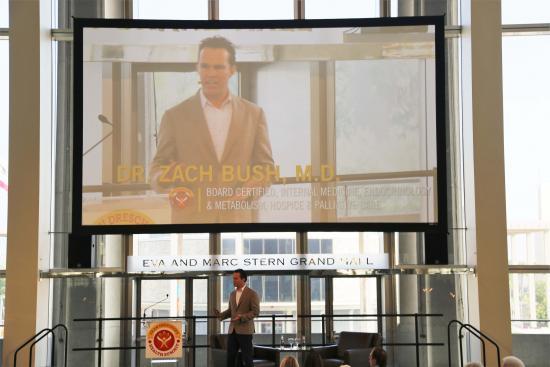Healthy Planet/Healthy Mind with Zach Bush, MD
One of the few triple board-certified physicians in the country, with expertise in Internal Medicine, Endocrinology and Metabolism, and Hospice/Palliative care, Dr. Zach Bush abandoned his prestigious academic career in cancer research, and his conventional medical practice a decade ago, after coming to terms with the fact that not only were his pharmaceutically based research and treatment protocols ineffectual; they were making his patients sicker. He then opened a clinic in the middle of a food desert in rural Virginia, where he swapped out pharmaceutical interventions for the medicinal properties of plants. Now based in Charlottesville, Dr. Bush has assembled an outstanding group of scientists and clinicians who are at the forefront of research on the microbiome and epigenetics. He has developed an impactful approach to healthcare which directly challenges ‘big farming,’ ‘big pharma’ and conventional medicine. Below, are some of the key themes that emerged during our conversation.
When We Damage Earth’s Ecosystem, there are Profound Costs to Human Health
Over the past several decades, we have systematically eroded the earth’s ecosystem — an ecosystem which we are inextricably a part of. Tens of thousands of industrial chemicals have made their way into the soil in which we grow our food, the air we breathe and the water we drink, with profound downstream consequences to human health. Dr. Bush makes a compelling case for a causal link between environmental degradation and the meteoric rise in chronic disease. Today, one in two men and one in three women will be diagnosed with cancer in their lifetime, not including skin cancer. Autism diagnoses have more than doubled in six short years from one in 84 in 2012 to one in 36 today, and symptoms of depression and anxiety are ubiquitous. A host of formerly rare autoimmune diseases such as multiple sclerosis, fibromyalgia and Parkinson’s, as well as life-threatening allergies and food sensitivities, are now commonplace.
Environments Instruct Our Genes: Epigenetics
If the human genome was the infallible blueprint for mental and physical development that conventional medicine and the media would have us believe, the state of our health would be relatively impervious to environmental degradation. Current research does not, in fact, support this dogma. Upon completing the Human Genome Project in the mid 2000s, researchers were shocked to discover that humans have a mere 20,000 genes compared for example to the 30,000 genes in the genome of a flea. It was anticipated that humans would have some 200,000 genes, each coding exclusively for one of the 200,000 proteins that our bodies require. This discovery forced the scientific community to radically rethink what our genes actually do, and it catapulted the science of epigenetics to the forefront of genetics research; a science which focuses on how environments instruct our genes. Since the completion of the Genome Project, there has been an upsurge of epigenetics research worldwide, that has revealed the extent to which genes are responsive to a myriad of environmental conditions. Environmental factors have the capacity to act as genetic on/off switches, and they determine which protein a given gene will code for at a given moment, some of which have diametrically opposite effects on the body.
Fully 98% of human DNA does not build genes. For decades this non-genetic DNA was dismissively labeled ‘junk DNA’ and it was assumed to be vestigial material that may have been useful earlier in our evolution. In the last five years, this so-called ‘junk DNA’ has been shown to play a vitally important epigenetic role. In response to environmental conditions, this non-coding DNA manufactures micro RNA which in turn acts as one of the on/off switches and determines which among hundreds of different proteins a given gene will code for. As Bush likes to say, 20,000 genes coding for 200,000 proteins means that we can build millions of different bodies, depending on environmental context; change your environment, build a different body.
Our Internal Ecosystem: The Microbiome
Another blow to the pride of place of the human genome is the explosion of international research on the microbiome over the past decade. It turns out that we serve as a ‘planet’ for a vast microbial ecosystem — consisting of trillions of bacteria, fungi, parasites and viruses and their accompanying genes which collectively number 100 times that of our human genes.




















